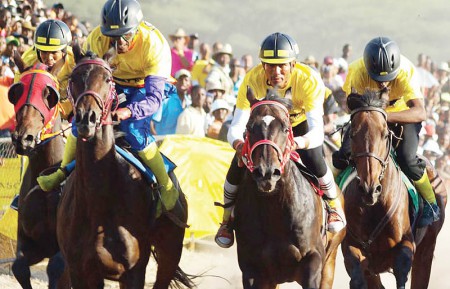Of dust, thunder, power and glory
Boniface Keakabetse | Friday April 10, 2015 13:51


Years back, cattle farmers in Ngamiland spent their leisure time racing horses. Few would have imagined that decades later, the love for the power of these beasts would annually attract enthusiasts from within and outside Botswana.
The Mascom Derby was held over the Easter holidays and brought to the minds of many old timers memories of yester-years when they ran horses in their youth.
The Ngamiland farming community has historically held horse racing in high esteem. As explained by Batawana deputy paramount chief, Bringle Dithapo, in the olden days, horseracing competitions were organised for fun unlike the current editions where cash is king.
Back in those days, the deputy chief says a horse track ran where the Maun Central Business District is presently located.
“Horses from all over Ngamiland used to race there in the town centre,” he said.
“The Mascom Derby owes its success to the love the district always had for horses.” Long time horse owner, Boitshoko Mosiane, said horseracing gained popularity in the late 1980s and early 1990s when the district agricultural show was still held.
“Horseracing was the highlight of the show and the budget for the prize money was P500 compared to what’s happening now.”
Mosiane pioneered horseracing together with other farmers who included Ntshemang Gaboekae, the late Batsweledi Ramathodi and Phillip Wright.
“In those days we bought horses from Gantsi farmers who sourced them from South Africa. A thoroughbred was bought for around P8,000.
“I bought a horse called Southern Affairs, which was commonly known as ‘Dikhele’ from Christiaan De Graaf and the horse terrorised local horses in Maun,” he recalled.
He continued: “Gaboekae had a horse called ‘lemon’ and the two horses competed ferociously. We kept and trained our racing horses at Hainaveld farms.”
Outbreaks of Foot and Mouth disease affected them as the pioneering horsemen ran out of money to buy horses to compete in the bigger Mascom Derby.
“We bought horses from cattle sales but the animal diseases in this district affected cattle production, which meant we did not have the money to buy and train competitive horses,” he explained.
“Government should subsidise horse feeds for horse racers as a way of developing the sport.”
The original horse owners had the opportunity to again witness their hard work paying off over the Easter weekend, as the derby rolled into town again.
Annually, the Mascom National Derby brings jockeys and their steeds to the dusty Shashe Horse track where they shower delirious fans with swathes of sand. The typically slim and diminutive jockeys marshal their mounts skilfully across the trek accompanied by squeals of joy from the crown.
Amongst the more than 15,000-strong crowd that annually convenes here is the former Member of Parliament Botsalo Ntuane and current acting Assistant Agriculture minister, Fidelis Molao. For the last five years, the duo has not missed the dust and the sun.
Of late, Namibians have joined in and with Lesotho horses now also in the derby, Basotho visitors are expected in the terraces soon.
This year, the derby was held over the Easter Holidays and once again lived up to its reputation. The event brought together 139 competitors who sweat it out over categories ranging from 800m; 1,000m;1,200m; 1,400m; 1,600m and 2,400m.
The numbers represented a 50 percent increase in participating horses for both the thoroughbred and Tswana breed categories. Of the 139 horses, 115 horses were from Botswana, with the balance coming from Lesotho and Namibia.
The fun in the sun over Easter was almost deflated by a dispute that arose weeks before the event.
Ahead of the event, organiser, Charles Mabua of Botsepa Agencies, announced that 12 Batswana stables had been suspended from this year’s festivities to the chagrin and outrage of many.
The decision was seen as a punishment to certain horse owners who threatened to boycott last year’s derby amidst complaints about organisational chaos.
As if the 12 absent stables were not enough to ruin the day, unexpected showers poured in Maun for three days ahead of the derby day, putting the event in jeopardy.
On Good Friday, a day before the event, organisers announced a postponement from Saturday to Sunday due to the rain.
The heavens, however, showed no signs of relenting on Saturday and many believed the event would have to be totally abandoned. However, Sunday came and the rain had miraculously stopped; and horse lovers descended for their treat, ignoring the ominous dark clouds that hovered about threatening to spoil the party.
As the weather relented, however, fresh trouble loomed over the event as it became clear that the racetrack had not been adequately prepared. Organisers suddenly found themselves in a race against time to prepare the track with an impatient crowd, riders, horses and VIP spectators waiting.
After more than three hours of waiting, the race started and in fact, the delay benefited enthusiasts who arrived late at the track, having spent the previous night engaged in festive partying ahead of the derby.
The derby started with Tswana horses and gradually moved through to the eagerly awaited thoroughbred category. Thumping their hooves on the watery track, the beasts, donned the national colours of their respective countries, preparing for a race for glory and small fortunes. As the sky darkened in the evening sky, the highlight of the event occurred with Novice John Douglas, a horse from Charleshill, galloping just before seven o’clock to win the grand 2,400-metre race.
It was an impassioned win for the horse, its jockey and owner, Stephen Monare, and also Botswana as the long race has previously been the preserve of horses from Namibia.
